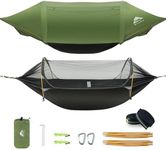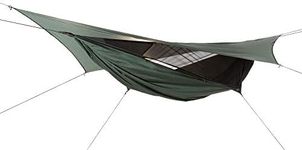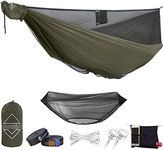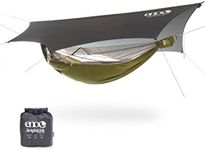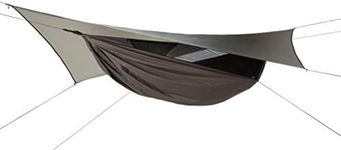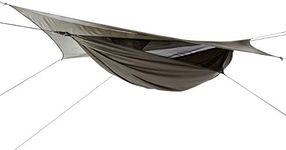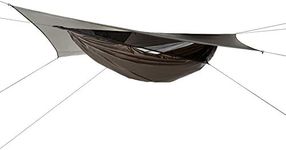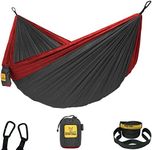Buying Guide for the Best Hammock Tents
Choosing a hammock tent is all about finding the right balance between comfort, protection, and portability for your outdoor adventures. Hammock tents are a great alternative to traditional tents, especially if you’re camping in areas with lots of trees. They keep you off the ground, away from bugs and dampness, and can be surprisingly cozy. To pick the best hammock tent for you, it’s important to understand the key features and how they match your camping style and environment.Weight CapacityWeight capacity refers to the maximum amount of weight the hammock tent can safely support. This is important because exceeding the limit can damage the hammock or even cause it to fail. Hammock tents typically come in different weight ranges: lighter models may support up to 200-250 pounds, standard ones up to 300-350 pounds, and heavy-duty options can handle 400 pounds or more. If you’re camping solo, a standard capacity is usually enough, but if you’re larger or plan to share the hammock, look for higher weight limits to ensure safety and comfort.
Size and DimensionsThe size and dimensions of a hammock tent determine how much space you’ll have to stretch out and how comfortable you’ll be while sleeping. Single hammocks are narrower and lighter, ideal for one person, while double hammocks are wider and can fit two people or offer extra space for one. If you value roominess or plan to share, go for a double; if you want to save on weight and pack size, a single might be best. Always check the length as well—taller users should look for longer hammocks to avoid cramped sleeping positions.
Material and DurabilityThe material of a hammock tent affects its strength, comfort, and how well it stands up to the elements. Common materials include nylon and polyester, with higher denier numbers indicating thicker, more durable fabric. Lightweight materials are easier to carry but may be less robust, while heavier fabrics offer more durability and protection. If you’re planning frequent or rugged use, prioritize durability; for occasional or lightweight trips, a lighter material may be sufficient.
Bug and Weather ProtectionBug and weather protection features include integrated bug nets and rainfly covers. A bug net is essential if you’re camping in areas with lots of insects, as it keeps mosquitoes and other bugs out while you sleep. A rainfly or tarp provides shelter from rain and wind, making your hammock tent usable in various weather conditions. Some hammock tents come with these features built-in, while others require you to add them separately. Consider your typical camping environment—if bugs or rain are common, make sure your hammock tent offers solid protection.
Suspension SystemThe suspension system includes the straps, carabiners, and other hardware used to hang your hammock tent between trees. A good suspension system is easy to set up, adjustable, and gentle on trees. Some systems are simple and lightweight, while others offer more adjustability or extra strength. If you’re new to hammock camping, look for user-friendly systems with clear instructions. If you camp in areas with varying tree distances, adjustable straps will make setup much easier.
Packability and WeightPackability and weight refer to how compact and light the hammock tent is when packed up. This is especially important for backpackers or anyone who needs to carry their gear over long distances. Lighter and more compact hammock tents are easier to transport but may sacrifice some comfort or durability. If you’re car camping, weight is less of a concern, but for hiking or backpacking, choose a model that fits easily in your pack and won’t weigh you down.
